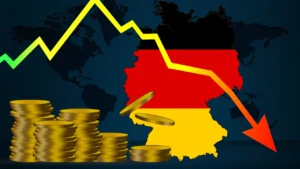
Evergrande is just the tip of the Chinese debt iceberg
Chiny mają ogromne zadłużenie korporacyjne. Według badań naukowych w tym przez S&P Global Ratings, dług ten wynosi 27 bl USD i jest o 159% wyższy niż na świecie i prawie wyższy niż w USA.
– “China’s growth has been largely driven by two factors. One is credit and the other is coal,” said Eunice Tan, one of the report’s lead authors and head of S&P Global Ratings’ credit research for the Asia-Pacific region.
The two-pronged actions of the Chinese authorities
Beijing now wants to tame both of these economic factors – credit and carbon – by maintaining stability and control, and by pursuing its GDP growth targets. Beijing has published a policy framework that outlines the path to peak carbon emissions by 2030, and the central bank is trying to contain its real estate debt and keep banks from exposure to troubled developers.
Recently, the indebted Chinese developer Evergrande has been in the spotlight, but real estate is not the only highly indebted industry in the country. Evergrande has avoided one of the largest insolvencies in history to date, but many Chinese companies are facing similar problems.
In its report, S&P Global Ratings surveyed over 25,000 companies, of which over 5,700 were based in China. When analyzing the financial data of Chinese companies, it was found that construction and engineering companies were the most indebted, with 91% of them showing high levels of debt. According to S&P indicators, a company is considered to have high levels of debt if its free cash flow is less than 12% of its total debt.
Large indebtedness of the transport industry
After construction and the technical industry, transport is the second most indebted sector. Tan explained that this sector includes both transport infrastructure and providers of transport services. Regional government officials have long funded infrastructure investments to spur GDP growth with so-called Local Government Finance Companies (LGFVs), which can hide debt off the books.
Nevertheless, a significant reduction in the level of corporate debt in China would require a fundamental reformulation of the country’s economic model. Over the decades, increasing debt has fueled economic growth, and the two have become so intertwined that it is difficult to reduce debt levels without compromising growth. Beijing is taking steps to reduce its debt, but the key question remains one in the title of the S&P report: Can China escape the corporate debt trap?



























